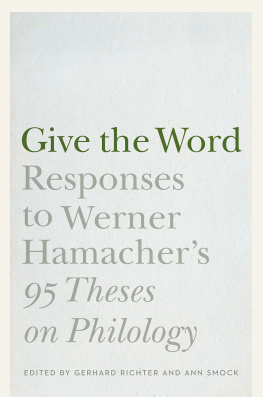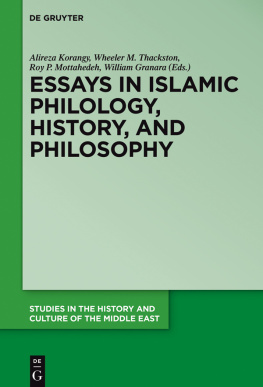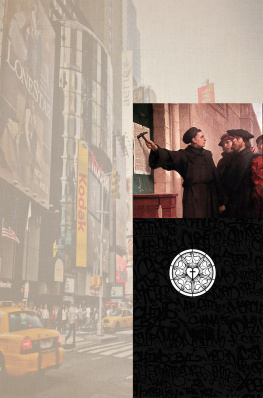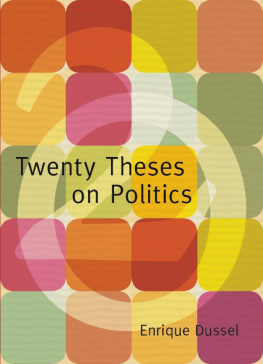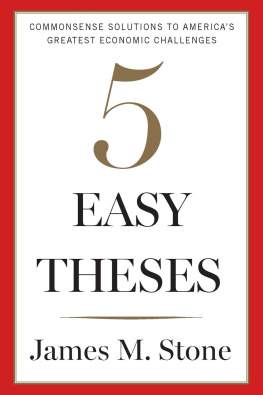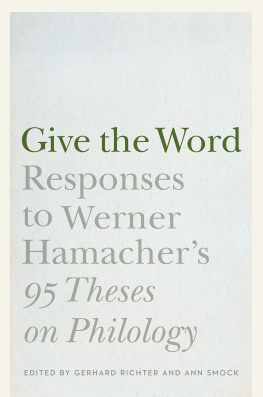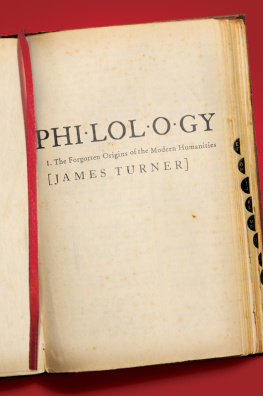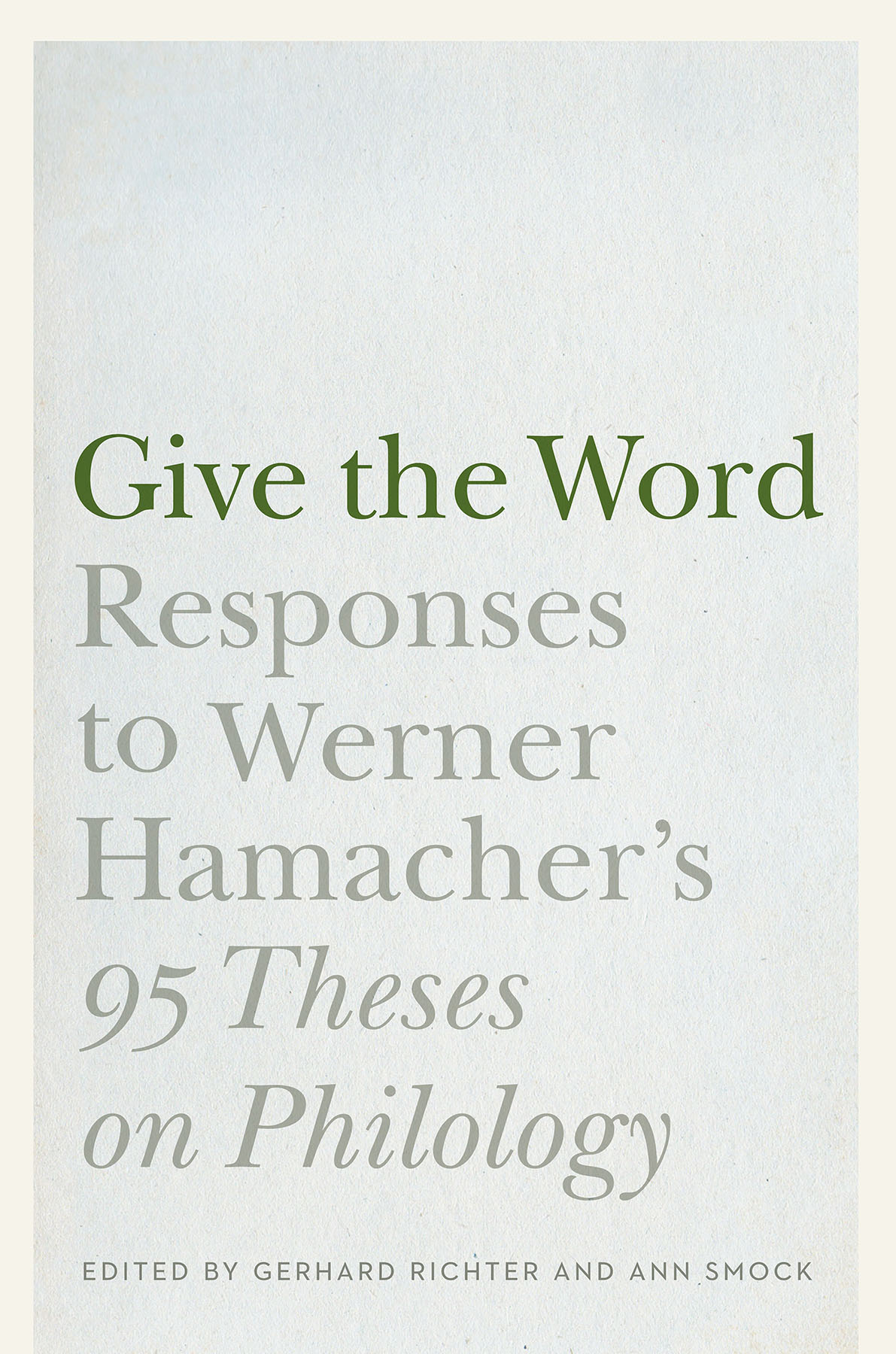
This is a stunningly original collection of essaysutterly engrossing and compelling. Probing, erudite, elegant, witty, these essays explore the concept of philology at once literally (literally literally, that is, to the letter, down to its smallest granules of articulation) and expansively, inviting us to rethink the fundamental categories of existencelanguage, translation, tradition, genealogy, history, sociability, love, kinship, in short, just about everything. Hamachers magnificent Theses could not find a more vibrant afterlife.
Rebecca Comay, professor of philosophy and comparative literature at the University of Toronto
Werner Hamachers 95 Theses on Philology proposes a new radical understanding of philology distinct from its dusty nineteenth-century conception. The eleven responses to his 95 Theses have provided him with an opportunity to comment extensively and in generous detail on the responses they provoked. Hamachers lengthy contribution is not only an extraordinary document of scholarly debate but also a superb piece in which he elaborates on the context of his Theses and on their rich theoretical and philosophical ramifications, thus also providing insight into the workings of his own thought.
Rodolphe Gasch, Distinguished Professor and Eugenio Donato Chair of Comparative Literature, University at Buffalo, the State University of New York
Stages
Series Editors
General Editor: Gerald Prince
University of Pennsylvania
Warren Motte
University of Colorado Boulder
Patricia Meyer Spacks
University of Virginia
Give the Word
Responses to Werner Hamachers 95 Theses on Philology
Edited by Gerhard Richter and Ann Smock
University of Nebraska Press | Lincoln
2019 by the Board of Regents of the University of Nebraska.
95 Thesen zur Philologie Werner Hamacher.
Cover designed by University of Nebraska Press.
All rights reserved.
The German original of Werner Hamachers 95 Theses on Philology is reprinted here by permission from the authors estate, courtesy of Shinu Sara Ottenburger; the English translation of 95 Theses on Philology is reproduced by permission from Fordham University Press.
Library of Congress Cataloging-in-Publication Data
Names: Richter, Gerhard, 1967, editor. | Smock, Ann, 1944, author. | Hamacher, Werner. 95 Thesen zur Philologie. English.
Title: Give the word: responses to Werner Hamachers 95 theses on philology / edited by Gerhard Richter and Ann Smock.
Description: Lincoln: University of Nebraska Press, [2019] | Series: Stages | Includes bibliographic references and index.
Identifiers: LCCN 2018040955
ISBN 9781496206527 (cloth: alk. paper)
ISBN 9781496213594 (epub)
ISBN 9781496213600 (mobi)
ISBN 9781496213617 (pdf)
Subjects: LCSH : PhilologyAnecdotes. | PhilologyPhilosophy. | Hamacher, Werner. 95 Thesen zur Philologie. | Hamacher, WernerCriticism and interpretation.
Classification: LCC P 33 . G 52 2019 | DDC 410dc23
LC record available at https://lccn.loc.gov/2018040955
Frontispiece: Werner Hamacher. The European Graduate School ( EGS ).
The publisher does not have any control over and does not assume any responsibility for author or third-party websites or their content.
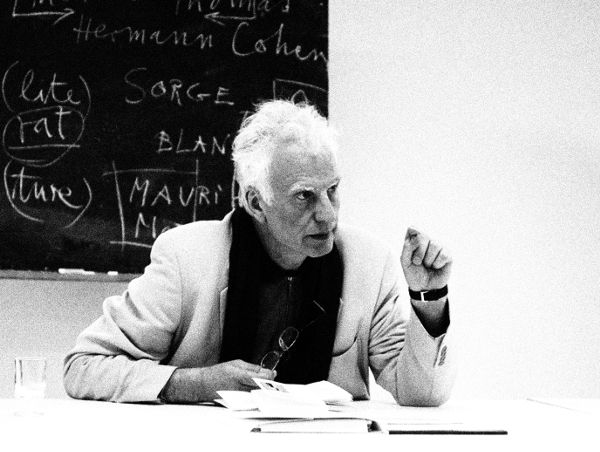
In Memoriam
Werner Hamacher
April 27, 1948July 7, 2017
Weltapfelgro die Trne neben dir,
durchrauscht, durchfahren
von Antwort,
Antwort,
Antwort.
Paul Celan, Give the Word
Contents
Werner Hamacher, translated by Catharine Diehl
Gerhard Richter and Ann Smock
Gerhard Richter
Michle Cohen-Halimi, translated by Ann Smock
Jan Plug
Sean Gurd
Ann Smock
Thomas Schestag
Vincent W.J. van Gerven Oei
Avital Irony Ronell
Peter Fenves
Susan Bernstein
Daniel Heller-Roazen
Werner Hamacher, translated by Kristina Mendicino
Werner Hamacher
Translated by Catharine Diehl
The elements of language explicate one another. They speak for that which still remains to be said within that which is said; they speak as philological additions to one another. Language is archiphilology.
Die Elemente der Sprache erlutern einander. Sie sprechen fr das, was vom Gesagten noch zu sagen bleibt; sie sprechen als philologische Zustze zu einander. Sprache ist Archiphilologie.
The elements of language explicate one another: they offer additions to what has hitherto been said, speak for one another as witnesses, as advocates, and as translators that open that which has been said onto that which is to be said: the elements of language relate to one another as languages. There is not one language but a multiplicity; not a stable multiplicity but only a perpetual multiplication of languages. The relation that the many languages within each individual language, and all individual languages, entertain to one another is philology. Philology: the perpetual extension of the elements of linguistic existence.
Die Elemente der Sprache erlutern einander: sie bieten Zustze zum jeweils Gesagten, sprechen fr einander als Zeugen, Advokaten und bersetzer, die das Gesagte auf das Zu Sagende ffnen: die Elemente der Sprache verhalten sich zueinander als Sprachen. Es gibt nicht eine Sprache, sondern nur eine Vielfalt; nicht eine stabile Vielfalt, sondern nur eine fortgesetzte Vervielfltigung von Sprachen. Das Verhltnis, das diese vielen Sprachen in jeder einzelnen Sprache und alle einzelnen Sprachen zueinander unterhalten, ist Philologie. Philologie: die fortgesetzte Extension der Elemente sprachlicher Existenz.
The fact that languages must be philologically clarified indicates that they remain obscure and reliant upon further clarifications. The fact that they must be expanded philologically indicates that they never suffice. Philology is repetition, clarification, and multiplication of impenetrably obscure languages.
Da Sprachen philologisch geklrt werden mssen, besagt, da sie dunkel und auf weitere Klrungen angewiesen bleiben. Da sie philologisch erweitert werden mssen, besagt: sie reichen nie aus. Philologie ist Wiederholung, Klrung und Vermehrung undurchdringlich dunkler Sprachen.
To be able to speak means to be able to speak beyond everything that has been spoken and means never to be able to speak enough. The agent of this beyond and of this neverenough is philology. Philology: transcending without transcendence.
Sprechen knnen heit ber alles Gesprochene hinaus und heit nie genug sprechen knnen. Der Agent jenes Darber-hinaus und dieses Nie-genug ist die Philologie. Philologie: Transzendieren ohne Transzendenz.
The idea of philology lies in a sheer speaking to and for [Zusprechen] without anything spoken of or addressed, without anything intended or communicated.
Die Idee der Philologie liegt im schieren Zusprechen ohne Gesprochenes und Angesprochenes, ohne Gemeintes und Mitgeteiltes.
The idea of philology, like the idea of language, forbids us from regarding them as something had [eine Habe]. Since the Aristotelian definition of man as a living being having language uses the (linguistic) category of having [Habe] for language itself, and thus tautologically, language is without a finite object and is itself a nonfinite category, an apeiron.
Next page
